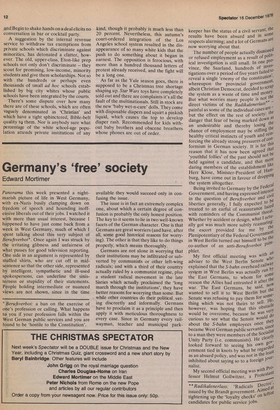Germany's 'free' society
Edward Mortimer
Panorama this week presented a nightmarish picture of life in West Germany, with ex-Nazis busily clamping down on freedom of speech and hounding inoffensive liberals out of their jobs. I watched it with more than usual interest, because I happened to have just come back from a week in West Germany, much of which I spent talking about this very subject of Beruftverbot* Once again I was struck by the irritating glibness and unfairness of what passes for good television reporting. One side in an argument is represented by stuffed shirts, who are cut off in midsentence so that the other side, represented by intelligent, sympathetic and ill-used spokespersons, can underline the sinisterness or stupidity of their statements. People holding intermediate or nuanced views are not shown, since in the time * Beruftverbot: a ban on the exercise of one's profession or calling. What happens to you if your profession falls within the West German public services and you are found to be 'hostile to the Constitution'. available they would succeed only in confusing the issue.
The issue is in fact an extremely complex one, about which a certain degree of confusion is probably the only honest position. The key to it seems to lie in two well-known facets of the German character. One is that Germans are great worriers (and have, after all, some good historical reasons for worrying). The other is that they like to do things properly, which means thoroughly.
Germans are not alone in worrying that their institutions may be infiltrated or subverted by communists or other left-wing radicals; and with a third of their country actually ruled by a communist regime, plus a student radical movement in the late Sixties which actually proclaimed the 'long march through the institutions', they have better reasons for worrying than some. But while other countries do their political veting discreetly and informally. Germans have to proclaim it as a principle and then apply it with meticulous thoroughness to every case. Since in Germany every railwayman, teacher and municipal park keeper has the status of a civil servant, the results have been absurd and in some respects alarming; and a lot of Germans are now worrying about that. The number of people actually dismissed or refused employment as a result of Powical investigation is still small. In one Pre" vince, the Saarland, hundreds of investigations over a period of five years failed t? reveal a single 'enemy of the constitution , whereupon the provincial government' albeit Christian Democrat, decided to scraP the system as a waste of time and mon* But what worries many people is not the direct victims of the Radikalenerlass' painful as some of the individual cases are but the effect on the rest of society: the danger that fear of being marked down as an undesirable and thereby losing the chance of employment may be stifling the healthy critical instincts of youth and reinforcing the already strong pressures of conformism in German society. It is for this reason that it has now been agreed that 'youthful follies' of the past should not be held against a candidate, and that more daring members of the establishment like Herr Klose, Minister-President of Hamburg, have come out in favour of droPPihg the system altogether. Being invited to Germany by the Federal Government, and having expressed interest ., in the question of Beruftverbot and civii liberties generally, I fully expected to be, treated to an earful of reassurance laced with reminders of the Communist threat' Whether by accident or dcsign, what I actually got was much more subtly reassuring: the escort provided for me by the Plenipotentiary of the Federal GovernMet" in West Berlin turned out himself to be the co-author of an anti-Berufsverbot pawphlet. My first official meeting was with au adviser to the West Berlin Senate will°, explained that the S-bahn overhead railway system in West Berlin was actually run u•T the East Germans, to whom for snule reason the Allies had entrusted it after the war. The East Germans, he said, 11°vi wanted to sell it to West Berlin but the Senate was refusing to pay them for some" thing which was not theirs to sell. He' however, was hoping that this obstacle would be overcome, because he was veZ curious to see what the Senate would u about the S-bahn employees once they became West German public servants, sine, to a man they were members of the Socialist Party (i.e. communists). He &all looked forward to seeing his own Pv:, ernment tied in knots by what he regarded as an absurd policy, and was not in the least inhibited about saying so to a foreign i°111nalist. My second official meeting was with professor Helmut Gollwitzer, a Protestant * * Radikalenerlass: 'Radicals Decre,iesi issued by the Brandt government. Aiine tightening up the 'loyalty checks' on lethst candidates for public service jobs. theologian who has played a leading role in the campaign against Berufsverbot. I asked him whether he thought the tide was turning in his favour. 'My hopes have risen, but are not yet very big,' he replied. 'The best PersPective is that we shall get a second German split, between the CDU-ruled and the SPD-ruled lands. Things may then be as they were in the Middle Ages, when heretic intellectuals could move from one court to another.'
Yet another official meeting was with a Professor of law and political science who said that the power of the state was growing, that the federal system was a sham, that it was all the fault of the Social Democrats, that the atmosphere of right-wing conformism was becoming intolerable, and that if things went on like this he would have to emigrate to England, where he liked to go anyway as often as possible to play polo. Somehow I never did get to hear the Official case in favour of the Berufrverbot. But I came away with the strong impression that free discussion still flourishes here and there, and that if the Verfassungschiitz** . really aimed to stamp out all nonconformity to do. they would still have some work „ verfassungstz: Office for the Protection of the Constitution. A special federal police force, charged with keeping files on all potential subversives.



































 Previous page
Previous page